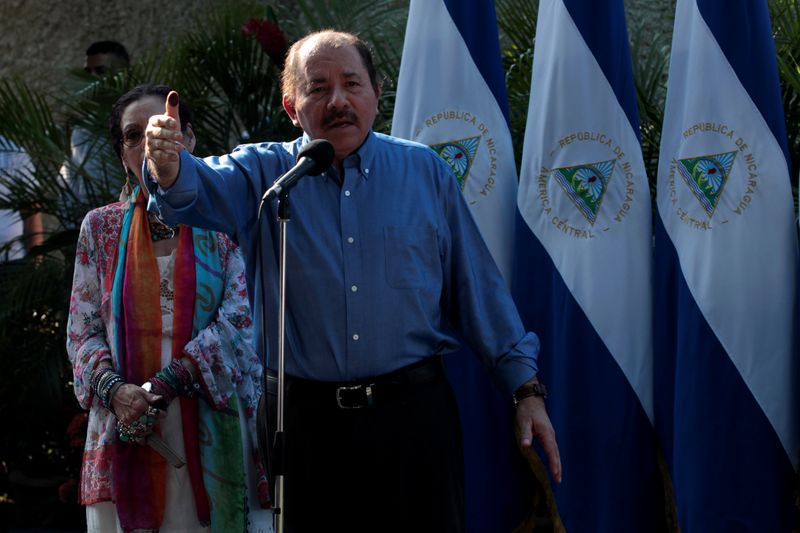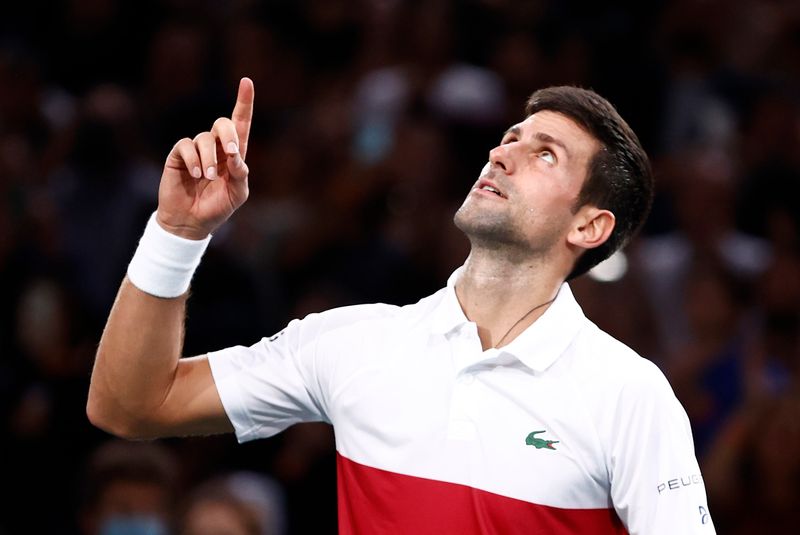
FILE PHOTO: Nicaragua’s President Daniel Ortega speaks after voting in the municipal elections at a polling station in Managua, Nicaragua November 5, 2017. REUTERS/Oswaldo Rivas
November 7, 2021
By Diego Oré and Daina Beth Solomon
(Reuters) -Nicaraguans went to the polls on Sunday in a presidential election marked by longtime President Daniel Ortega’s ruthless campaign to extend his tight grip on power by jailing opponents in a contest the United States and other critics dismiss as a sham.
Small lines of voters formed in the capital Managua just after polls opened at 7:00 a.m. local time (1300 GMT), with a few proudly showing off their ink-stained thumbs after casting their ballots. Voting ends at 6:00 p.m.
Ortega, a onetime guerrilla who helped depose a right-wing family dictatorship in 1979, is almost certain to get a fourth straight term to prolong his status as the Americas’ longest-serving leader, alongside his wife, Vice President Rosario Murillo.
In neighboring Costa Rica, where thousands of Nicaraguan exiles have fled in recent years, around 2,000 anti-Ortega protesters marched along a main downtown San Jose thoroughfare, snaking down eight blocks.
Chants of “long live a free Nicaragua” rang out as festive marimba music blared from speakers.
Ortega first became president in the 1980s before losing in a 1990 upset, and he returned to the top job again in 2007.
Since May, Ortega’s police have imprisoned nearly 40 leading opposition figures, including seven presidential candidates, as well as prominent business leaders, journalists and even some of his former rebel allies.
Ortega’s only opposition on the ballot comes from five less-known candidates of small allied parties. Abstention was expected to be high, with about 4.5 million Nicaraguans eligible to vote.
Ortega can, however, still count on hard-core supporters.
“We need to stand by the Sandinista front’s anti-poverty agenda so that our people can continue being victorious,” said Laura Valdez, a member of Ortega’s Sandinista National Liberation Front (FSLN).
Meanwhile, posts on social media early Sunday from one of the two main opposition coalitions, the Blue and White National Union party, included pictures of empty streets.
“We stay at home today,” the party proclaimed on Twitter.
‘WIDELY DISCREDITED’
Also up for grabs are 92 seats in the unicameral Congress, also firmly controlled by Ortega’s allies.
Jason Marczak, a researcher at the Washington-based Atlantic Council who specializes in Central American politics, dismissed Sunday’s vote as “widely discredited,” adding that Ortega’s unpopularity could only be overcome with brute force.
“His victory will only have been possible by locking up would-be competitors,” he said.
Ortega’s current term took an especially repressive turn in 2018, when he quashed largely peaceful protests by those initially upset over spending cuts, killing more than 300 people and wounding thousands more.
Last year, the ruling party brought in a new law criminalizing dissent, and in recent months foreign journalists have been barred from entering.
One Reuters reporter was turned back by border agents last Friday, while another, a Nicaraguan citizen, was turned away in September.
International observers were allowed into the country only from allies including from Russia and some Latin American leftist movements, not critics like the European Union or the Organization of American States (OAS).
U.S. Secretary of State Antony Blinken last month deplored the “sham election,” accusing Ortega, 75, and Murillo, 70, of seeking an “authoritarian dynasty.”
Last week, U.S. officials said new sanctions were being considered against the power couple’s government, a sentiment echoed by European Union leaders, in addition to a future review of Nicaragua’s status in the CAFTA regional trade pact.
Ortega, a Cold War-era U.S. antagonist and Marxist rebel in the toppling of the Somoza dictatorship in 1979, brushes off international criticism, saying Nicaragua must fight imperialists and that sanctions will not defeat him.
While most analysts agree Ortega is likely to prevail in the near term, just as fellow leftist strongmen in Cuba and Venezuela have done in recent years, they also say prolonged unrest could drive new waves of fleeing Nicaraguans.
Many have gone either south to Costa Rica, or sought to reach the U.S. border, pushed by an economic slump prior to the coronavirus pandemic.
Gross domestic product shrank nearly 9% from 2018 to 2020, compared to robust average growth of almost 4% since 2000.
Analysts such as the Atlantic Council’s Marczak are already looking past Sunday’s vote.
“The question is not what happens on November 7,” he said, “but how strongly the U.S. and other democracies respond on November 8.”
(Reporting by Diego Ore and Daina Beth Solomon; Additional reporting by Alvaro Murillo; Writing by David Alire Garcia, Editing by Daniel Flynn, Clarence Fernandez and Chizu Nomiyama)

